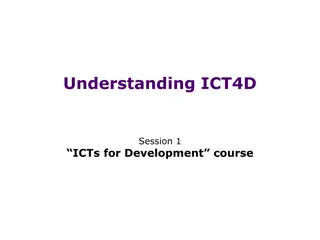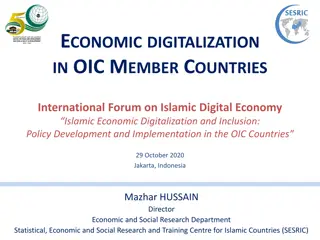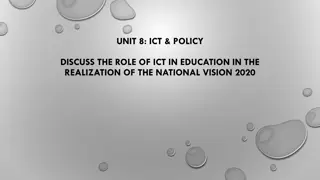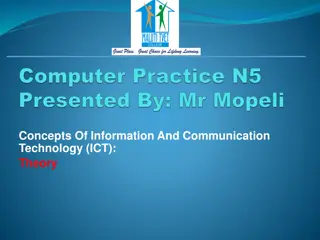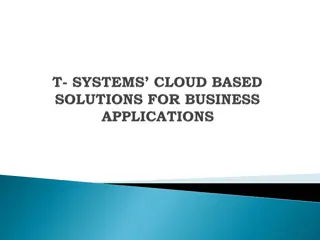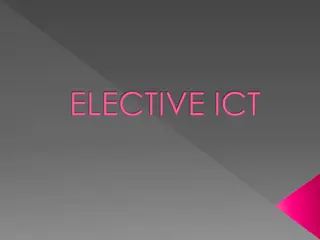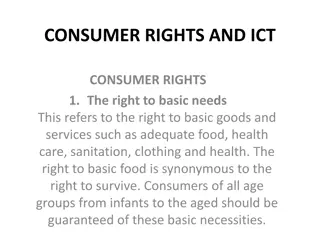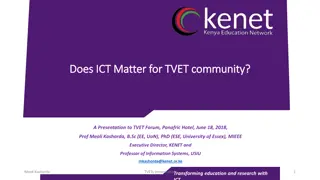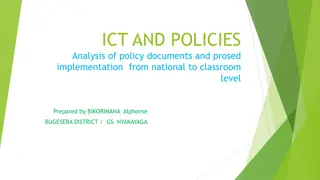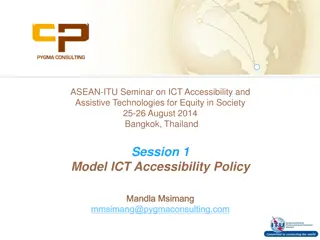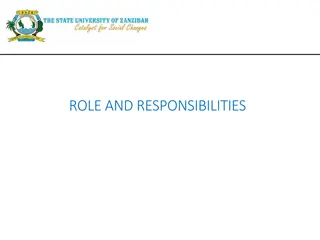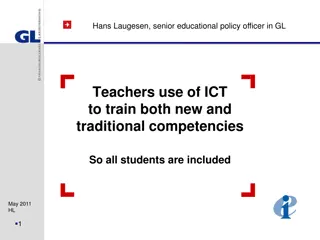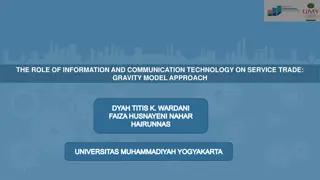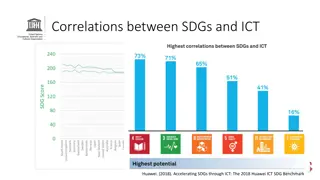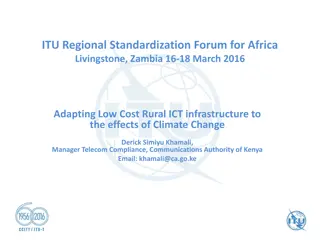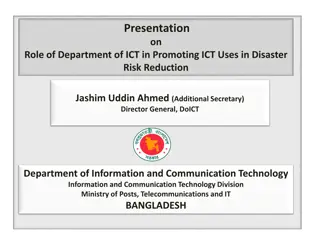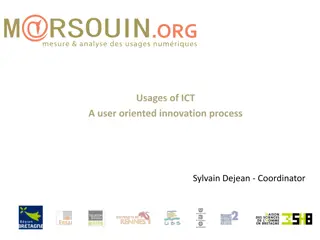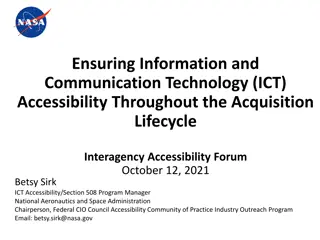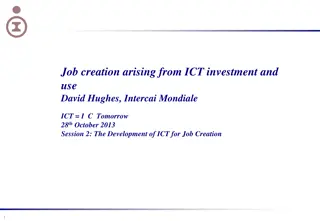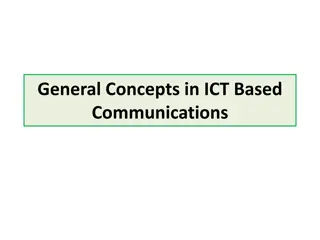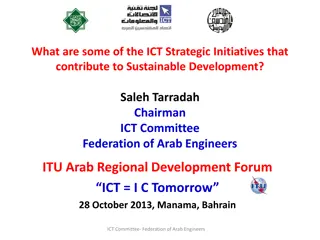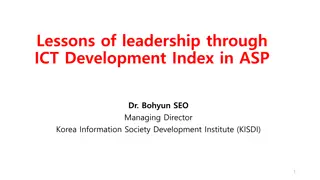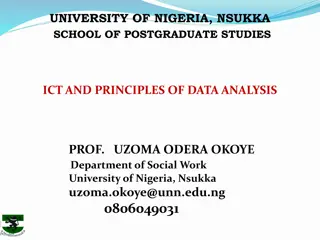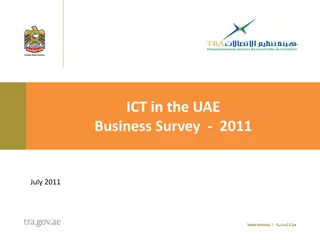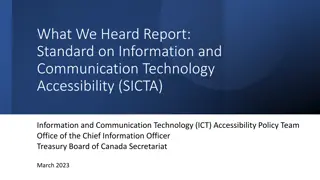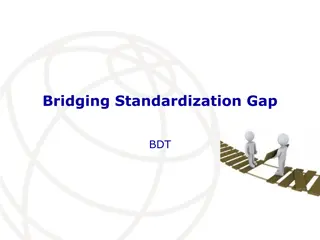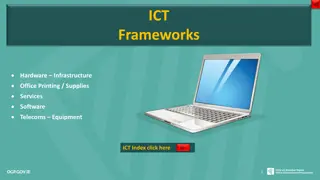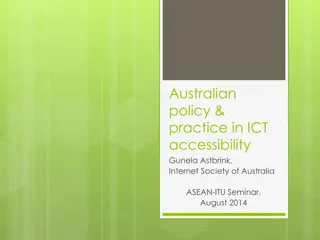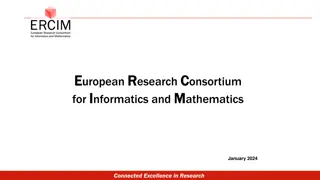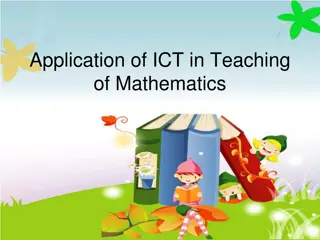Life Orientation Computer Skills
Information and Communication Technology (ICT) involves the processing and distribution of data using computer hardware, software, and telecommunications like the Internet. Module 1 explores the advantages and disadvantages of ICT, the impact of ICT devices on our daily lives, and the importance of
3 views • 23 slides
Understanding ICT4D: A Comprehensive Overview
This content delves into various aspects of Information and Communication Technologies for Development (ICT4D), covering topics such as defining information and communication, the CIPSO view of ICT systems, different scopes of ICT, and different scopes of development. Richard Heeks from the Universi
1 views • 17 slides
Economic Digitalization in OIC Member Countries: Opportunities and Challenges
Economic digitalization in OIC member countries is gaining momentum, with a focus on integrating digital technologies into everyday life and fostering the digital economy. This shift presents both prospects and challenges, requiring a comprehensive strategy for policy development and implementation.
0 views • 22 slides
ICT Industry in Western Balkans: Growth and Challenges
The ICT industry in the Western Balkans region has shown steady growth, becoming an important employer and contributing significantly to the GDP. A recent workforce assessment report highlights the constraints and challenges faced by ICT companies in terms of skill availability. Recommendations have
0 views • 54 slides
Progress in Implementing CSW 47th Conclusion in Kenya
ICT plays a vital role in Kenya's national development, with initiatives aimed at empowering women and bridging the gender gap in technology usage. The country's legal and policy framework emphasizes inclusivity and optimal management of ICT. Innovations like the e-fertilizer service and mHealth are
1 views • 23 slides
The Role of ICT in Education for National Vision 2020
The use of Information and Communication Technologies (ICT) in education plays a crucial role in realizing the objectives of the national vision for 2020. ICT enables innovations in teaching methods, facilitates distance learning, and enhances learner-centered approaches. Additionally, ICT is vital
0 views • 13 slides
Understanding Types of Computers in Information and Communication Technology (ICT)
Explore the main types of computers in ICT, including Mainframe Computers, Servers, and Personal Computers such as Desktops, Laptops, and Tablets. Learn about their functions, uses, and distinguishing features to enhance your understanding of ICT.
1 views • 20 slides
Meeting the Demands of Modern Enterprise ICT Services
One of Europe's largest ICT service providers, T-Systems offers a wide range of IT, telecommunications, and integrated ICT services with extensive experience in managing complex outsourcing projects. With a global presence and cloud computing capabilities, T-Systems enables businesses to adapt to th
0 views • 28 slides
Transforming DEFRA's ICT Landscape: UnITy Programme Overview
DEFRA's UnITy Programme aims to streamline and modernize its commercial ICT operations by addressing compatibility issues and reducing costs associated with multiple suppliers. Through a strategic procurement approach and lean sourcing methodology, DEFRA seeks to establish sustainable and efficient
0 views • 5 slides
Comprehensive Overview of Elective ICT Curriculum
This elective ICT course offers students a higher level of content to prepare them with essential knowledge and skills for both the job market and further ICT studies. The syllabus covers topics such as Spreadsheet, Data Processing Systems, Programming, Networking, Data Communications, and Education
3 views • 19 slides
Consumer Rights and ICT: Empowering Consumers Through Information and Communication Technology
Ensuring consumer rights, such as access to basic needs, safety, information, choice, and education, is crucial in today's society. Information and Communication Technology (ICT) plays a significant role in empowering consumers by providing access to information, promoting safety, facilitating infor
1 views • 20 slides
Does ICT Matter for TVET community?
This presentation by Prof. Meoli Kashorda focuses on the significance of Information and Communication Technology (ICT) for Technical and Vocational Education and Training (TVET) communities. It delves into the history and services of KENET, emphasizing the role of ICT in enhancing education, resear
0 views • 24 slides
Analysis of ICT Policies Implementation from National to Classroom Level
ICT plays a crucial role in various sectors, especially in education, according to Rwanda's government policy. This analysis delves into how ICT policies are implemented at national and classroom levels, focusing on data management, teacher training, digital content provision, and utilization of ICT
0 views • 9 slides
Enhancing Equity Through Model ICT Accessibility Policy
Model ICT Accessibility Policy aims to ensure accessibility rights for persons with disabilities in ICT, aligning with UN Convention mandates. Developed resources assist policymakers in formulating and implementing inclusive policies in public access, mobile communications, TV/video programming, web
0 views • 24 slides
Roles and Responsibilities in Education: ICT Teacher Insights
Exploring the essential roles and responsibilities within the field of education, specifically focusing on ICT teachers. Dive into the meaning of roles and responsibilities, the multifaceted nature of teaching, and the specific duties of ICT teachers in delivering a comprehensive computing curriculu
0 views • 12 slides
Analysis of ICT Use in Education in Denmark - May 2011
Hans Laugesen, a senior educational policy officer in GL, pointed out the challenges and unexplored possibilities in utilizing ICT for teaching both new and traditional competencies in education. The PISA report highlighted disparities in ICT use between genders and emphasized the need for innovativ
0 views • 12 slides
The Role of ICT in Service Trade: Gravity Model Approach
Information and Communication Technology (ICT) plays a crucial role in international service trade, with the application of the gravity model theory to analyze the flow of trade. This study explores how technology, particularly ICT, influences service trade within the ASEAN region. It delves into th
0 views • 21 slides
Accelerating SDGs Through ICT: Huawei's 2018 Benchmark Report
Explore the correlations between Sustainable Development Goals (SDGs) and Information and Communication Technology (ICT) in Huawei's 2018 benchmark report. The report highlights key strategies in SDG4 related to basic skills, gender equality, literacy, and access to ICT resources. Additionally, it d
1 views • 6 slides
Adapting Low-Cost Rural ICT Infrastructure to Climate Change Effects
Explore the adaptation of low-cost rural ICT infrastructure to combat the impacts of climate change, focusing on interdependency, smart sustainability, policy issues, and steps for adaptation in the ICT sector. Concepts like scientific, collaborative, and cost-effective principles are essential for
0 views • 34 slides
Role of Department of ICT in Disaster Risk Reduction in Bangladesh
The Department of Information and Communication Technology (ICT) in Bangladesh plays a crucial role in promoting the use of ICT for disaster risk reduction. Bangladesh faces numerous catastrophic hazards, making it essential to utilize ICT for warning systems, relief management, and post-disaster ac
0 views • 16 slides
Enforcement & Compliance Presentation to New CA Employees
This presentation by Daniel K. Waturu, a Telecoms Specialist at AFRALTI, focuses on discussing various aspects related to enforcement and compliance in the ICT sector, including dealing with technological challenges, improving ICT laws, suggesting enforcement models, qualities of an effective enforc
0 views • 7 slides
Emerging Trends in the Global ICT Industry
The evolution of ICT is showcased through the trends in smart handheld devices, ultra-high-definition LCD TVs, cloud applications, and the increasing demand for big data analysis. The article also delves into the opportunities and challenges presented by ICT in various sectors such as manufacturing,
0 views • 55 slides
Faculty Perspectives on Excellence in ICT and E-Learning Use
This study explores student and faculty perspectives on ICT use in colleges. It examines the challenges faced by professors in incorporating technology, showcasing varying viewpoints between students and professors on the effectiveness of ICT tools in education.
0 views • 15 slides
Innovations in User-Oriented ICT Research at M@rsouin
M@rsouin is a research initiative focusing on ICT innovations in user-oriented processes. Led by Sylvain Dejean, M@rsouin coordinates interdisciplinary expertise to study Internet usage, evaluate public policies, and collaborate with industries. With three key platforms supporting researchers across
0 views • 23 slides
Enhancing Disability Inclusion Through ICT in Nigeria
Nigeria has shown significant progress in utilizing ICT for government activities, internet services, and online platforms. The country is also focusing on enhancing accessibility for persons with disabilities by increasing awareness and use of ICT within the disability community. While challenges l
0 views • 44 slides
Ensuring ICT Accessibility in Federal Acquisitions
This content highlights the importance of ensuring Information and Communication Technology (ICT) accessibility throughout the acquisition lifecycle in federal agencies. Section 508 of the Rehabilitation Act of 1973 mandates that federal agencies make technology accessible to employees and the publi
0 views • 12 slides
The Impact of ICT Investment on Job Creation and Economic Growth
Investment in ICT plays a significant role in job creation and economic growth by contributing to the production of goods and services, increasing productivity, and generating overall growth. The use of ICT capital as an input in various sectors leads to spillover effects and drives GDP growth. Vari
0 views • 14 slides
Essential Concepts in ICT-Based Communications for Agricultural Extension Programs
Explore the foundations of ICT-based communications in agricultural extension, covering concepts, tools, advantages, limitations, and practical applications. Dive into case studies, project work, and the integration of ICT tools like mobile technologies and e-learning concepts to enhance extension s
0 views • 60 slides
ICT Strategic Initiatives for Sustainable Development by Saleh Tarradah, Chairman ICT Committee, Federation of Arab Engineers
Information and communication technologies (ICTs) play a vital role in sustainable development by promoting economic growth, social cohesion, cultural enrichment, and environmental conservation. Initiatives include utilizing limited resources, minimizing environmental impact, and improving ICT produ
0 views • 8 slides
Leadership Lessons in ICT Development Index by Dr. Bohyun SEO
Exploring the ICT Development Index (IDI) as a benchmark for monitoring global ICT progress, this content covers recent developments in the information society with insights on mobile and fixed broadband subscriptions, digital divides, and ICT access. Dr. Bohyun SEO, Managing Director of Korea Infor
0 views • 15 slides
Starting a Small-Scale ICT Business Enterprise: Moonlite Web Designers
Explore the essentials of launching an ICT business venture with a focus on website designing, hardware repairs, software development, and more. Learn about website design, methodology, budgeting, challenges, findings, and recommendations for success in the field. Discover the potential benefits and
0 views • 9 slides
Morality in UK Drug Policy: Policy Constellations Analysis
Morality plays a significant role in shaping drug policy in the UK, as revealed by the research conducted by Professor Alex Stevens at the University of Kent. The study investigates the moral commitments underlying different policy positions in UK drug policy debates, highlighting five ethico-politi
0 views • 19 slides
Principles of Data Analysis and ICT in Postgraduate Studies at University of Nigeria
This lecture at the University of Nigeria, Nsukka, School of Postgraduate Studies focuses on the importance of ICT in data analysis, different data collection strategies, and the significance of using qualitative and quantitative data. The goals include creating awareness about ICT's role, refreshin
0 views • 22 slides
Survey of ICT Usage in Businesses in the UAE
A detailed survey conducted by the Telecommunications Regulatory Authority (TRA) of the UAE in 2011 focused on businesses' adoption and satisfaction with ICT services. The survey covered various aspects such as fixed line telephony, mobile telephony, internet services, e-commerce, and consumer satis
0 views • 59 slides
Feedback Summary on Standard for ICT Accessibility in Canada
The report presents insights and feedback gathered from a targeted engagement on the Standard on Information and Communication Technology (ICT) Accessibility in Canada. It outlines key themes, points of feedback, and steps taken to address them. This initiative aims to enhance accessibility standard
0 views • 11 slides
Bridging the Standardization Gap in ICT Development
Participation in ICT standardization processes is essential for bridging the gap between developed and developing countries. Strong standards aid in establishing technical requirements, ensuring safe and interoperable ICT equipment, and reducing the digital divide. Initiatives such as capacity build
0 views • 15 slides
ICT Frameworks and Microsoft Licensing Services Overview
This document outlines various ICT frameworks, hardware infrastructure, office printing supplies, software services, and more. It also provides details on Microsoft licensing services including renewal of licenses, advisory services, SAM services, and different agreement types like EA, EAS, SCE, CSP
0 views • 24 slides
Accessibility Policies and Practices in Australian ICT: A Review
Australian policy and practice in ICT accessibility are guided by the UN Convention on the Rights of Persons with Disabilities, with a focus on the Disability Discrimination Act. Initiatives like the National Disability Strategy and Web Accessibility National Transition Strategy aim to create inclus
0 views • 20 slides
ERCIM: Driving ICT Excellence in Europe
European Research Consortium for Informatics and Mathematics (ERCIM) is dedicated to advancing Europe's role in ICT through collaborative research, networking, and support. With a focus on excellence, innovation, and international cooperation, ERCIM serves as a bridge between research and applicatio
0 views • 18 slides
Enhancing Mathematics Education with ICT Tools
Information and Communication Technology (ICT) plays a significant role in the teaching of mathematics by providing various tools and resources for efficient learning and teaching. ICT tools like MS-Word, MS-Excel, and PowerPoint enable teachers to create engaging lessons, conduct assessments, and v
0 views • 21 slides

